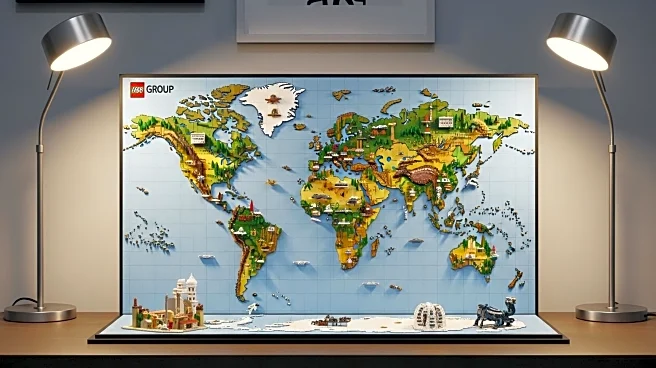What's Happening?
The LEGO Group has reported significant growth in the first half of 2025, solidifying its position as a leader in the global toy manufacturing industry. This growth is attributed to increased demand, particularly in Western Europe and CEEMEA regions, where LEGO continues to dominate the market. The company has focused on expanding its manufacturing capabilities and investing in sustainable and digital innovations to support both short- and long-term growth. LEGO introduced 314 new sets, marking a record high in its product offerings, and has successfully catered to a wide demographic, from children to adults, with diverse themes. Notable successes include the LEGO Botanicals line and partnerships with Formula 1, which have garnered global attention.
Why It's Important?
LEGO's expansion and innovation efforts are crucial for maintaining its competitive edge in the toy industry. By investing in sustainable manufacturing and digital innovations, LEGO is not only meeting current consumer demands but also positioning itself for future growth. The introduction of new product lines and strategic partnerships, such as the collaboration with Pokémon, highlights LEGO's commitment to innovation and market adaptation. This approach not only strengthens LEGO's brand but also ensures its relevance in a rapidly changing market. The focus on inspiring creativity among young female builders through campaigns like 'She Built That' demonstrates LEGO's proactive stance in understanding and meeting diverse consumer preferences.
What's Next?
LEGO's collaboration with Pokémon is expected to bring new and exciting product offerings, further reinforcing its commitment to innovation. The company will likely continue to explore strategic partnerships and expand its product portfolio to cater to evolving consumer interests. As LEGO invests in sustainable and digital manufacturing, it may set industry standards for environmentally friendly practices. The ongoing focus on diversity and inclusion, particularly in inspiring young female builders, suggests that LEGO will continue to tap into important market segments, potentially influencing broader industry trends.
Beyond the Headlines
LEGO's strategic initiatives reflect broader trends in the toy industry, such as the increasing importance of sustainability and digital innovation. By prioritizing these areas, LEGO not only enhances its own growth prospects but also contributes to setting industry standards. The emphasis on diversity and inclusion, particularly in campaigns targeting young female builders, highlights a cultural shift towards more inclusive marketing strategies. This approach may influence other companies to adopt similar practices, potentially leading to a more diverse and representative industry landscape.









